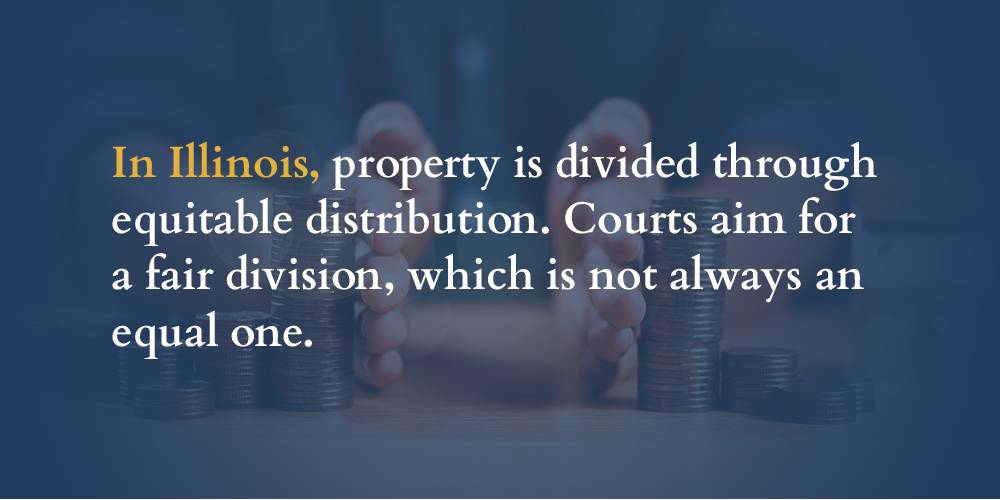Is Illinois a Community Property State?
 If you are considering divorce in Illinois, one of the first questions you may have is: "Is Illinois a community property state?" The answer is no. Illinois follows the principle of equitable distribution, not community property. That difference is important, because it affects how your assets and debts will be divided during divorce.
If you are considering divorce in Illinois, one of the first questions you may have is: "Is Illinois a community property state?" The answer is no. Illinois follows the principle of equitable distribution, not community property. That difference is important, because it affects how your assets and debts will be divided during divorce.
For couples getting divorced, understanding how Illinois divorce law treats property can clear up a lot of confusion. Many people are surprised to learn that Illinois does not automatically divide property 50/50. Below, our Will County, IL divorce attorney explains what equitable distribution means and what you need to know if you are preparing for divorce.
What Is the Difference Between Community Property and Equitable Distribution?
In community property states like California or Texas, marital property is usually split 50/50 between spouses, no matter the circumstances. Each spouse owns half of the property acquired during the marriage, and each is responsible for half of the debt.
Illinois, however, follows the principle of equitable distribution under the Illinois Marriage and Dissolution of Marriage Act (750 ILCS 5/503). This means that marital property is divided fairly; sometimes it can be divided equally, but not always. Courts look at many factors to decide what "fair" means in each case.
Illinois is a no-fault divorce state, which means you do not need to prove wrongdoing to get divorced. Fault, such as adultery or abandonment, does not directly affect how property is divided. However, financial misconduct — like wasting marital money on an affair — can influence the outcome of your property division.
What Counts as Marital Property in Illinois?
In Illinois, "marital property" generally includes anything acquired by either spouse during the marriage, regardless of whose name is on the title. That includes everything from the family home, cars, bank accounts, retirement savings, businesses, and even debt.
"Non-marital property" usually includes assets owned before the marriage, inheritances, gifts specifically given to one spouse, and property that was excluded from the marital estate by a prenuptial or postnuptial agreement.
Does the Court Always Decide How Property Is Split in a Divorce?
Many couples are able to reach agreements on their own, often with the help of mediation. Because our attorney is a court-appointed mediator, we understand how to guide spouses toward compromises that avoid costly litigation.
If spouses cannot agree, the judge will decide. Courts in Illinois must consider a list of statutory factors when dividing property.
What Factors Do Illinois Courts Consider When Dividing Property in Divorce?
When deciding how to divide marital property, judges look at many factors. These include how long the marriage lasted and how much each spouse contributed to the marriage (both financially and otherwise). Judges will want to know each spouse’s income and earning potential, whether a spouse wasted assets, and how each spouse helped increase the value of any pre-existing property.
Once they have this information, judges need to make decisions about alimony (called "spousal maintenance" in Illinois), child support, and any other needs the spouses or children may have. Judges are given the flexibility to create divisions that are fair in each specific circumstance.
What Happens to the Family Home in a Divorce?
The family home is often one of the biggest concerns in divorce. If you have children, the court may award the home to the parent who will have the majority of parenting time, to provide stability for the children. If not, the home may be sold and the money divided. Sometimes one spouse "buys out" the other’s share to keep the home. Other times, spouses agree to co-own the home temporarily until it can be sold.
What About Retirement Accounts and Pensions During Divorce?
Retirement savings earned during the marriage are considered marital property, even if the account is in only one spouse’s name. Dividing these accounts usually requires a special court order called a Qualified Domestic Relations Order (QDRO). This allows funds to be transferred without tax penalties.
Pensions are more complicated because the court must figure out how much of the benefit was earned during the marriage and how to divide it fairly.
What Happens to Debt in a Divorce?
Marital debt is divided in the same way as assets. If debt was taken on during the marriage, both spouses may be responsible, regardless of whose name is on the account. Marital debt can include mortgages, credit cards, car loans, and medical bills.
If debt is tied to non-marital property, such as a loan for a business that was owned before the marriage, it may be considered the responsibility of just one spouse.
Can Prenuptial or Postnuptial Agreements Change the Rules About Divorce and Property Division?
If you signed a valid prenuptial or postnuptial agreement, it may decide how property is divided. Illinois law allows these agreements as long as they were entered into voluntarily and fairly. Courts generally enforce them, though they can be challenged if there is evidence of fraud or duress.
How Is Business Ownership Addressed in Divorce?
If you own a business, dividing it during divorce can be difficult. First, the court must decide whether the business is marital or non-marital property. If the business was started or grew significantly during the marriage, at least part of it may be considered marital property.
Valuation is key. Courts rely on financial experts to determine a business’s worth. From there, options may include one spouse buying out the other’s interest, selling the business, or dividing profits in another fair way.
Can Mediation Help With Property Division?
Mediation can be very helpful in dividing property during an Illinois divorce. A neutral mediator helps spouses negotiate agreements without the stress of a courtroom battle. Because our attorney is a court-appointed mediator, we often use mediation to resolve disputes without going to trial. Mediation gives you more control, saves time and money, and often results in solutions both spouses can live with.

Contact a Naperville, IL Property Division Lawyer
If you are wondering whether Illinois is a community property state, you are already taking the right step by learning about how your assets and debts will be divided. The process is not simple, but with the right guidance, it can be handled fairly.
A Will County, IL divorce attorney at Law Office of Ronald L. Hendrix, P.C. can explain your options, represent your interests, and help you move forward with confidence. With more than 30 years of experience, we are prepared to help you navigate even the most complex property issues. Call 630-355-7776 today to schedule a free consultation so we can get started.

















